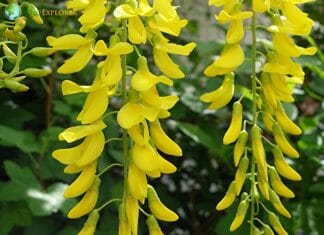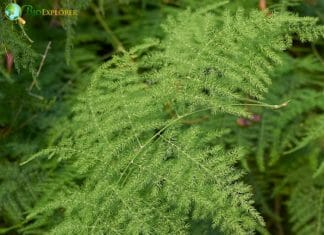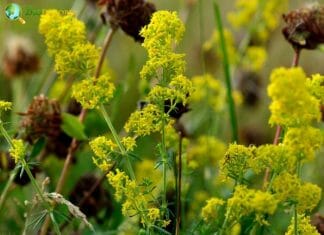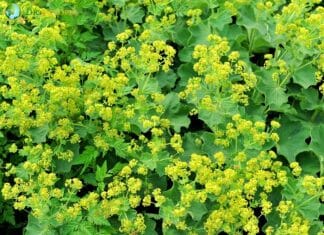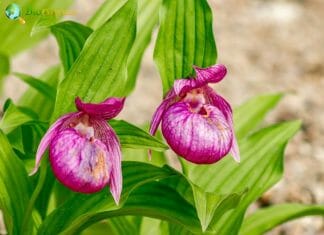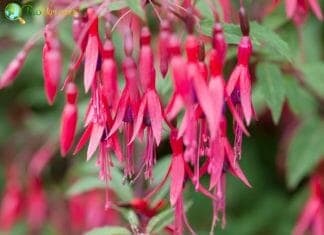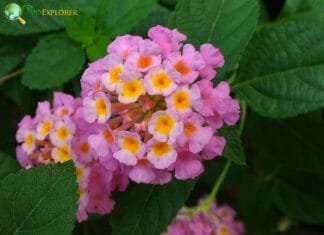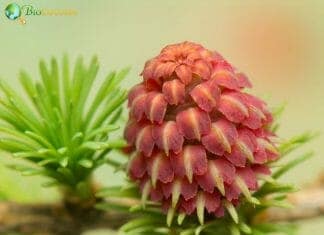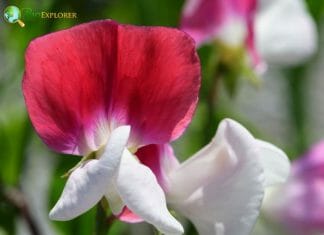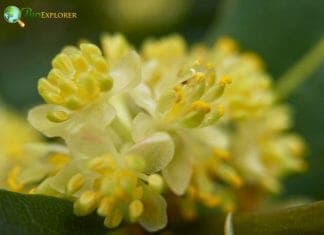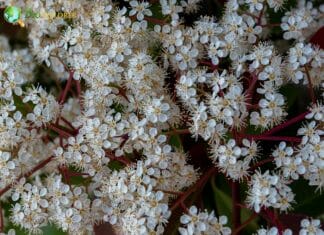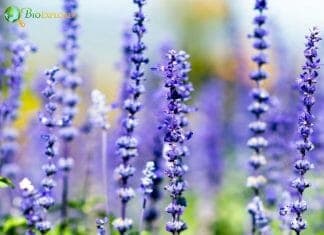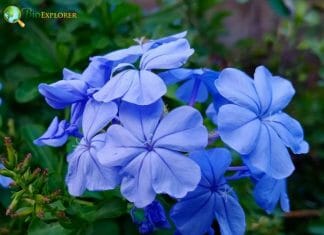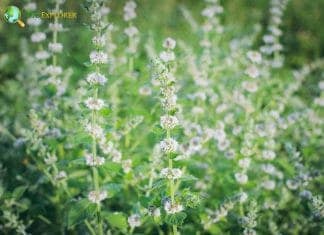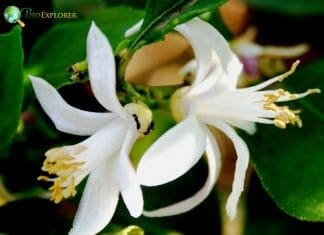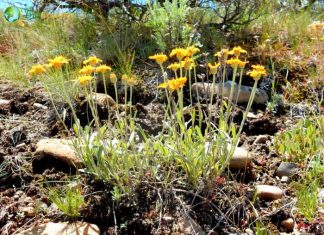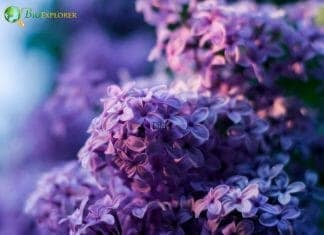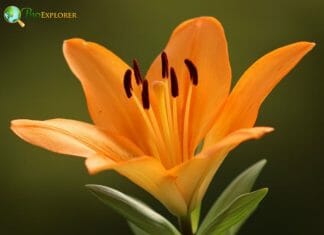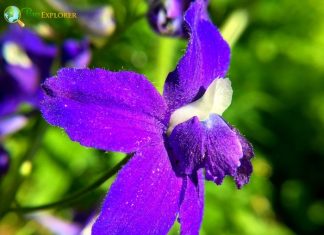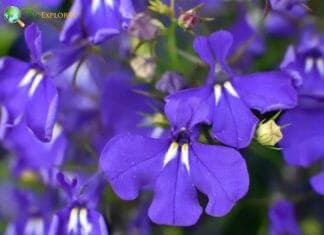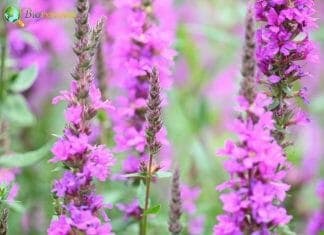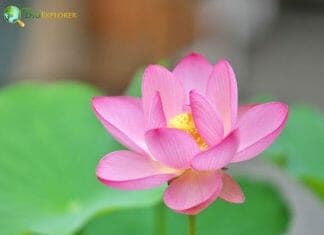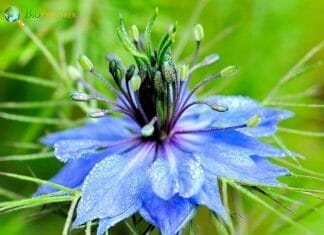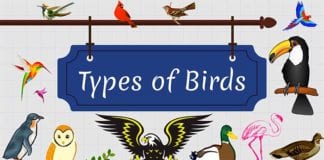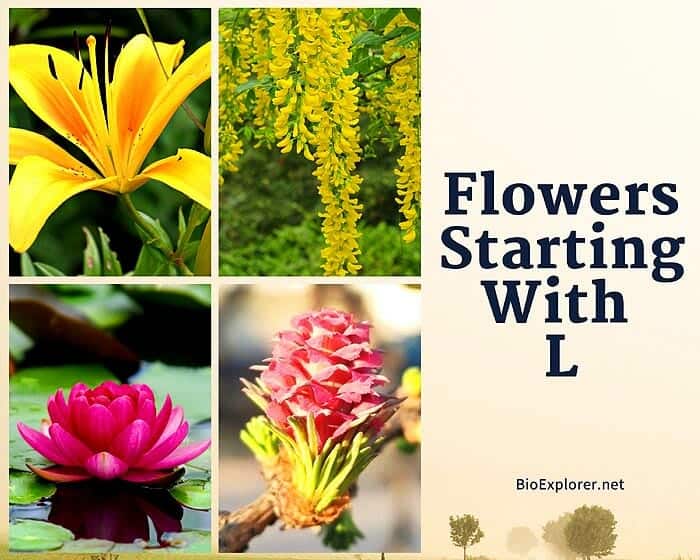
Lotus and lily flowers are the core symbols of worship in Buddhism, representing a symbol of enlightenment as they emerge from the mud. They are used for their beauty, purity, and meditation purposes. The lotus flower is a perennial plant native to India. It grows in marshy areas and can even grow entirely underwater, including its flowers.
You can grow these flowers starting with L for your next garden project.
Flowers Starting with L
Here is the group of flowers starting with the letter L.
Laburnum
Laburnum is a deciduous plant that belongs to the Fabaceae (pea) family. There are 2 species of laburnum that are indigenous to southern and central Europe. It's perhaps best known for its lush and showy spring blooms, with yellow flowers in dense, drooping, wisteria-like clusters (up to 4-8 inches long.)
Lace Fern
Flower Type: Perennials
Lace Fern (Asparagus setaceus), commonly known as ferny asparagus, climbing asparagus, or asparagus grass, is a climber in the genus Asparagus. Blooming from spring to fall, the small greenish-white bell flowers are 0.4 centimeters long. It grows quickly and is easy to care for.
Lady’s Bedstraw
Flower Type: Perennials
Lady's Bedstraw (Galium verum), also known as the yellow bedstraw and cheese rennet, is a somewhat herbaceous rhizomatous perennial in the Rubiaceae family. In summer (July to September), four-petaled, bright yellow, fragrant flowers bloom in clustered, dense panicles.
Lady’s Mantle
Flower Type: Perennials
lchemilla mollis, also known as Lady's Mantle, is a simple way to add beauty to your garden. Lady's mantle displays delicate yellow flowers that bloom in airy masses on the foliage from late spring to early summer.
Lady’s Slipper
Flower Type: Perennials
The Lady's Slipper (Cypripedium species) is a perennial wildflower of the Orchidaceae (orchid) family indigenous to North America. Presently 52 species are recognized in the Cypripedium genus. Lady's Slippers are available in three different color arrangements: yellow, pink and white, and the rare plain white.
Lady’s-eardrop
Lady's-eardrop (Fuchsia magellanica) is an eye-catching hedge in milder regions where it remains semi-evergreen. Lady's-eardrop is an erect, deciduous shrub with lanceolate leaves. It grows up to 3.6 meters (11 feet) by 2 meters (6 feet) tall at medium speed and produces numerous small, tubular pendulous flowers in shades of pink, red, and often white.
Lantana
Flower Type: Perennials
Lantana camara, also known as common Lantana, is a species of the Verbenaceae (verbena) family indigenous to the American tropics. Each flower is tubular and has four elongated lobes (petals) that change color with age. The colors come in different shades of pink, red, orange, yellow, or white.
Larch
If you like the effect of a coniferous plant and a deciduous tree's bright color, you can have both with the Larch tree (Larix spp.). Nestled between the needles, you'll find pink flowers that will eventually turn into cones. The cones start out yellow or red and turn brown as they ripen.
Lathyrus odoratus
Flower Type: Annuals
Also known as the sweet pea flower, Lathyrus odoratus is an annual flowering plant cultivated for its attractive and fragrant flowers. You can sometimes see them nicely arranged in bouquets or adding a nice splash of color to home gardens. Plant species have purple flowers, but many varieties now offer a variety of additional flower colors, including white, lavender, blue, red, pink, and bicolor.
Laurestine
Laurustine (Viburnum tinus) is a vigorous evergreen shrub known for its showy clusters of flowers, brightly colored berries, and leathery leaves. The blossoms are small, light pink or white, and are formed in winter from reddish-pink florets in dense racemes with a diameter of 5 to 10 cm.
Lavandula
Flower Type: Perennials
Lavandula angustifolia is undoubtedly amongst the most popular herbaceous plants. With its purple flowers, the fragrant plant adorns many window sills, gardens, and balconies. Lavandula typically blooms between late May and mid-September. There it forms purple flowers, rarely white, which are arranged in pseudo-whorls.
Leadwort
Flower Type: Perennials
The name Leadwort may not sound flattering, but this beautiful, hardworking perennial always deserves a place in a home garden. The terminal clumps of five-petalled gentian blue flowers (1/2 to 3/4 inch in diameter) appear on the foliage during a long flowering period from summer to frost.
Lemon Balm
Flower Type: Perennials
Lemon Balm (Melissa officinalis) is a classic culinary and medicinal herbaceous plant that shouldn't be missing in any balcony or garden. Lemon balm, or simply lemon balm, is part of the Lamiaceae family. Unfortunately, the Melissa genus has only a few representatives with just 4 species. The pale-white lipped flowers, approximately 1 cm in size, grow in the axils of the leaves.
Lemon Blossom
Lemon (Citrus × limon) is a hybrid of the genus Citrus and the common name for the popular edible fruit of this small, sprawling tree or shrub. The slightly fragrant flowers can be single, or there can be two or more. The opened flowers have 4 or 5 petals, white on top and purple on the underside.
Lemon’s Rubberweed
Flower Type: Biennials
Hymenoxys lemmonii is a perennial herb of the Asterceae family. The plant can grow to a height of 15-20 inches. The plants of the genus Hymenoxys contain sesquiterpene lactone hymenoxon, which is toxic to sheep.
Lilac
Known as "Queen of the Shrubs", lilac is one of the most challenging and most fragrant flowering shrubs in many gardens today. You may recognize them as a flower in your grandmother's garden. Its stem flowers are usually available in white, blue, purple, and pink colors, adding height and softness to any garden.
Lily
Flower Type: Perennials
The beautiful flower of the lily plant makes it among the most well-known flowering plants in horticulture. But this eye-catching flower is more than it looks. The flowers are generally scented and come in various colors, including pink, purple, red, orange, white, or yellow.
Little Larkspur
Flower Type: Perennials
Delphinium bicolor is a perennial plant of the Buttercup (Ranunculaceae) family. The stems of the Little Larkspur have a height of 4-24 inches. The Little Larkspur plants can absorb toxic substances, like herbicides, pesticides, and pollutants.
Lobelia
Flower Type: Annuals/Perennials
Colorful lobelias are an excellent choice for garden design around streams and ponds, anywhere the soil is constantly moist. The plant produces showy flower spikes in all shades of white, blue, red, and pink. The two upper lobes can be upright, while the three lower lobes can be extended.
Loosestrife
Flower Type: Perennials
Purple loosestrife (Lythrum salicaria) is a flowering plant in the Lythraceae family. It is a large family of plants with over 150 species of evergreen and herbaceous perennials. The sessile leaves are alternate or opposite on the stalk. The purple loosestrife inflorescence consists of many showy, white, magenta, or reddish-purple flowers found in racemes.
Lotus Flower
The lotus (Nelumbo nucifera) is an emergent aquatic plant that grows with its roots at the bottom of the water source and its flowers and leaves on its surface. The lotus, sometimes mistakenly referred to as a water lily, is available in shades from bright pink to white. The plant has 2 round leaves that typically float on the water.
Love-in-a-Mist
Flower Type: Annuals
With a popular name like Love-in-a-Mist, one could guess that Nigella damascena would have a romantic story. The flowers are usually pale blue to light blue, but some can be lavender, pink, or white. Each flower is 1½-inches wide, with five large, petal-shaped sepals and tiny, deeply divided petals hidden under the stamens.
Lupine
Flower Type: Annuals/Perennials
If you are looking for an eye-catching perennial with summer flowers that will stand out from the crowd, lupine (Lupinus polyphyllus) is a favorite. The flowers open from the bottom up and sometimes feature over one color on the same plant, in shades ranging from soft pastels to violet blues and deep reds.
Cite This Page
APA7MLA8Chicago
BioExplorer.net. (2025, April 12). Flowers Starting with L. Bio Explorer. https://www.bioexplorer.net/plants/flowers/l/.
BioExplorer.net. "Flowers Starting with L" Bio Explorer, 12 April 2025, https://www.bioexplorer.net/plants/flowers/l/.
BioExplorer.net. "Flowers Starting with L" Bio Explorer, April 12 2025. https://www.bioexplorer.net/plants/flowers/l/.


